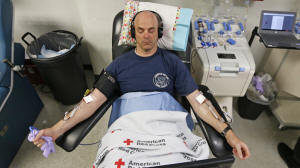Utah Republicans push to let patients supply their own blood as vaccine
concerns linger
 Send a link to a friend
Send a link to a friend
 [February 20, 2025]
By HANNAH SCHOENBAUM [February 20, 2025]
By HANNAH SCHOENBAUM
SALT LAKE CITY (AP) — Utah may soon loosen its B.Y.O.B. rules, but not
in the way some might hope. The acronym has taken on a new meaning in
the state Legislature: “Bring Your Own Blood.”
Health care facilities in Utah would be required to let patients use
their own blood for procedures or choose their own donor under a bill
that passed the state House with unanimous support Wednesday, despite
concerns from the American Red Cross.
Directed donations, which typically involve a patient’s friend or family
member giving blood for their procedure, are allowed under federal law.
But the requests undergo a rigorous screening process that the bill's
sponsor, an outspoken opponent of vaccines, said does not give patients
enough personal choice in their medical decisions.
Hospitals and blood collectors like the American Red Cross currently
have broad discretion to decide whether it's safe and feasible for a
patient to use their own blood or that of a chosen donor. Many
facilities saw a rise in requests during the COVID-19 pandemic due to
concerns about vaccine transmission that medical professionals say are
unfounded.

The Republican proposal, which now heads to the Senate, makes it so Utah
health providers can no longer block someone from supplying their own
blood, except in emergencies. Hospitals would not be liable for any
injuries or deaths that may result from using the blood.
Similar legislation is being considered in Texas and was floated in past
legislative sessions in Iowa and Kentucky, but did not pass.
“This bill was brought to me by patients who have requested to use
directed blood donation, including their own blood, at Utah hospitals
and have been denied,” said freshman Rep. Kristen Chevrier, the bill's
sponsor. “Their situations are serious and delicate.”
The Republican from Highland argued patients should be able to receive
blood from people they trust, rather than go through blood banks that do
not disclose to patients their donor's medical history.
Before her election to the Legislature, Chevrier led multiple
anti-vaccine organizations that warned against taking COVID-19 shots and
fought against vaccination requirements imposed by schools and
employers. She and other supporters have acknowledged that the bill
would let patients who are weary of COVID-19 vaccines handpick donors
with a similarly unvaccinated status.
[to top of second column]
|

Eric Timpson gives blood at the American Red Cross Donation Center,
March 23, 2020, in Murray, Utah. (AP Photo/Rick Bowmer, File)
 According to the U.S. Food and Drug
Administration, justification for such requests “is not supported by
any medical or scientific evidence.” Vaccine components do not
replicate through blood transfusions or alter a blood recipient's
DNA, meaning an unvaccinated patient could not receive the COVID-19
vaccine via a vaccinated donor's blood.
Requests to use blood from a known donor are often driven by a
patient’s preference rather than a medical need, said Daniel Parra
of the American Red Cross, the largest blood collector in Utah. An
increase in those requests would divert resources away from those
requiring lifesaving care, he cautioned.
“This bill would create unnecessary and harmful impacts on the
delivery of lifesaving blood to patients,” Parra told The Associated
Press. “While this bill may be well-intentioned, it offers no public
health benefit and could negatively impact patient care.”
Kristina Pexton, a blood transfusion specialist at a Utah hospital,
told lawmakers at a recent committee hearing that she worried the
bill would place a strain on the system.
Directed donations also carry a greater risk than the community
blood supply, Parra warned. Family and friends may feel pressure to
donate and might not be fully transparent about their health
history, which he said increases the risk of the recipient
contracting an infectious disease.
There is no evidence that patients can select safer donors than the
volunteer blood system provides. Still, several residents told
lawmakers the choice was important to them.
“Something so personal as our health care, something that is
especially as personal as blood, we should always have that choice,”
said Gayle Ruzicka.
All contents © copyright 2025 Associated Press. All rights reserved
 |